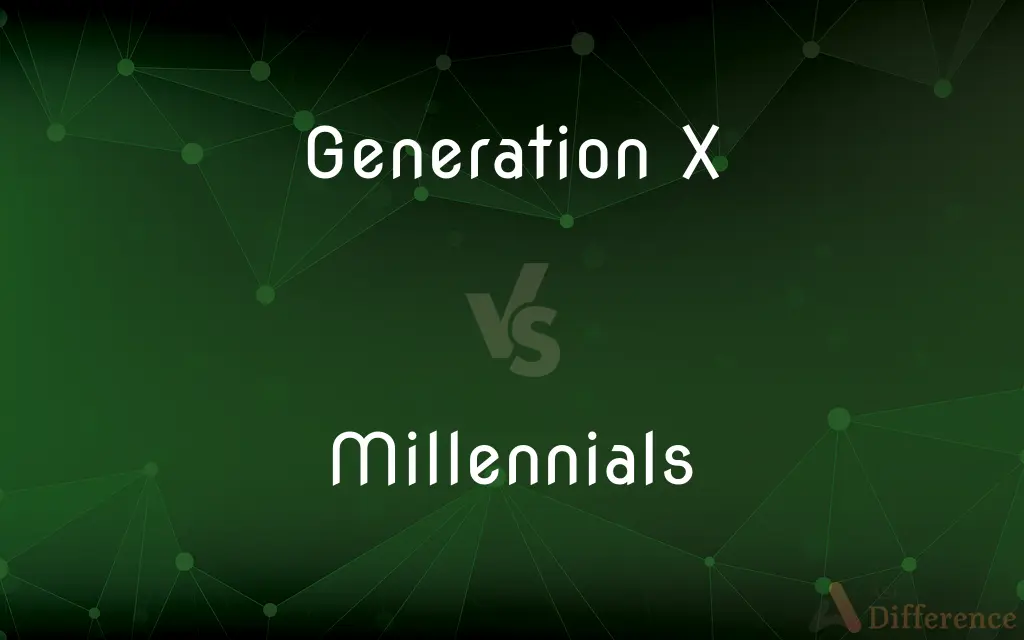Generation X vs. Millennials — What's the Difference?
By Urooj Arif & Maham Liaqat — Published on October 24, 2024
Generation X refers to people born from 1965 to 1980, known for their independence and skepticism towards institutions, while Millennials, born from 1981 to 1996, are tech-savvy, value work-life balance, and are more optimistic about institutional change.

Difference Between Generation X and Millennials
Table of Contents
ADVERTISEMENT
Key Differences
Generation X grew up during significant political and social changes, including the end of the Cold War and the rise of personal computing, which fostered a sense of skepticism and a value for independence. They are often considered the "latchkey kids," growing up in an era of increasing divorce rates and dual-income families, leading to a self-reliant and resourceful character.
Millennials, on the other hand, came of age during the rapid expansion of the internet and digital technology, shaping their reputation as digital natives comfortable with rapid change and innovation. This generation has faced significant economic challenges, including the Great Recession, which has influenced their career paths, financial attitudes, and delayed milestones such as home ownership.
Millennials are characterized by their desire for work-life balance, social consciousness, and optimistic approach to driving change, often seeking meaningful work and valuing corporate social responsibility. Generation X's approach to work is pragmatic and autonomous, with a strong sense of independence and a desire for stability, likely influenced by the economic uncertainties of their formative years.
The parenting styles between the two generations also differ, with Generation X parents emphasizing independence and resilience in their children, likely a reflection of their own upbringing. Millennial parents are more inclined towards involvement and advocacy for their children, often criticized as overprotective or helicopter parenting.
Educationally, Millennials have been encouraged from a young age to pursue higher education and are the most educated generation in history, whereas Generation X was the first to truly embrace higher education en masse, but without the same level of pressure or expectation.
ADVERTISEMENT
Both generations have made significant contributions to society and the workforce, with Generation X often bridging the gap between the Baby Boomers and Millennials. Despite their differences, both generations share common goals of job security, work satisfaction, and a desire for a balanced life, albeit with different approaches and under different circumstances.
Comparison Chart
Birth Years
1965 to 1980
1981 to 1996
Key Characteristics
Independent, skeptical, adaptable
Tech-savvy, optimistic, socially conscious
Work Ethic
Pragmatic, value stability and independence
Seek meaningful work, value work-life balance
Communication
Blend of analog and digital
Predominantly digital, value connectivity
Economic Challenges
Early adulthood recession, dot-com bubble burst
Great Recession, student loan debt
Parenting Styles
Emphasize independence
Inclined towards involvement and advocacy
Education
First to embrace higher education en masse
Most educated, encouraged to pursue degrees
Technological Adaptation
Adapted to digital revolution in adulthood
Digital natives, grew up with the internet
Compare with Definitions
Generation X
Pragmatic and adaptable in the workforce.
He leverages his Gen X adaptability to navigate career changes.
Millennials
Faces unique economic challenges like the Great Recession and student debt.
His Millennial experience includes managing significant student loans.
Generation X
Born between 1965 and 1980, known for valuing independence and skepticism.
As a Generation X member, she values self-reliance in her professional life.
Millennials
Born between 1981 and 1996, characterized by being tech-savvy and optimistic.
As a Millennial, she's always exploring the latest technology trends.
Generation X
Prefers a balance of digital and analog communication.
She appreciates emails but values face-to-face meetings.
Millennials
Values work-life balance and meaningful employment.
She seeks jobs that offer both purpose and flexibility.
Generation X
Raised in an era of economic uncertainty, influencing a desire for job stability.
Their Gen X skepticism makes them cautious about financial investments.
Millennials
Grew up with the internet and digital communication as the norm.
He uses social media daily, a typical Millennial trait.
Generation X
Experienced significant political and social changes during formative years.
Growing up during the fall of the Berlin Wall shaped his worldview.
Millennials
Advocates for social issues and corporate responsibility.
They are involved in social activism, reflecting Millennial values.
Millennials
Plural of millennial
Common Curiosities
What defines Generation X?
Generation X is defined by its birth years (1965-1980), a blend of skepticism and independence, and a pragmatic approach to work and life.
In what ways do Gen X and Millennials view technology differently?
Gen X adapted to digital technology as adults, blending analog and digital communication, whereas Millennials are digital natives, fully immersed in digital technology from a young age.
What are the hallmark traits of Millennials?
Millennials are known for their tech-savviness, optimism, value on work-life balance, and social consciousness.
How do the economic challenges faced by Gen X and Millennials differ?
Gen X faced the dot-com bubble and early adulthood recessions, while Millennials grappled with the Great Recession and soaring student debt.
What impact have Gen X and Millennials had on the workplace?
Gen X brought independence and adaptability, serving as a bridge between Baby Boomers and Millennials, who introduce tech-driven changes and prioritize corporate social responsibility.
How do the parenting styles of Gen X and Millennials compare?
Gen X parents emphasize independence based on their latchkey kid experience, while Millennials lean towards more involved and advocacy-oriented parenting.
Can the economic challenges faced by Millennials affect their long-term financial stability?
Yes, the combination of the Great Recession's impact and higher student debt levels can affect Millennials' long-term financial planning and stability, including savings and home ownership.
How have Gen X's experiences influenced their view on technology and communication?
Gen X's unique position of experiencing both pre- and post-digital revolution life has given them a balanced appreciation for both analog and digital forms of communication, valuing the efficiency of digital tools while recognizing the importance of personal interactions.
Why are Millennials considered the most educated generation?
Millennials have had greater access to and encouragement for higher education, resulting in higher college attendance and graduation rates compared to previous generations.
How do Gen X and Millennials approach work-life balance?
While both value work-life balance, Millennials are more likely to seek job flexibility and meaningful work that aligns with their values, compared to Gen X's pragmatic approach to job stability.
Share Your Discovery

Previous Comparison
BSSID vs. SSID
Next Comparison
Type I Error vs. Type II ErrorAuthor Spotlight
Written by
Urooj ArifUrooj is a skilled content writer at Ask Difference, known for her exceptional ability to simplify complex topics into engaging and informative content. With a passion for research and a flair for clear, concise writing, she consistently delivers articles that resonate with our diverse audience.
Co-written by
Maham Liaqat











































